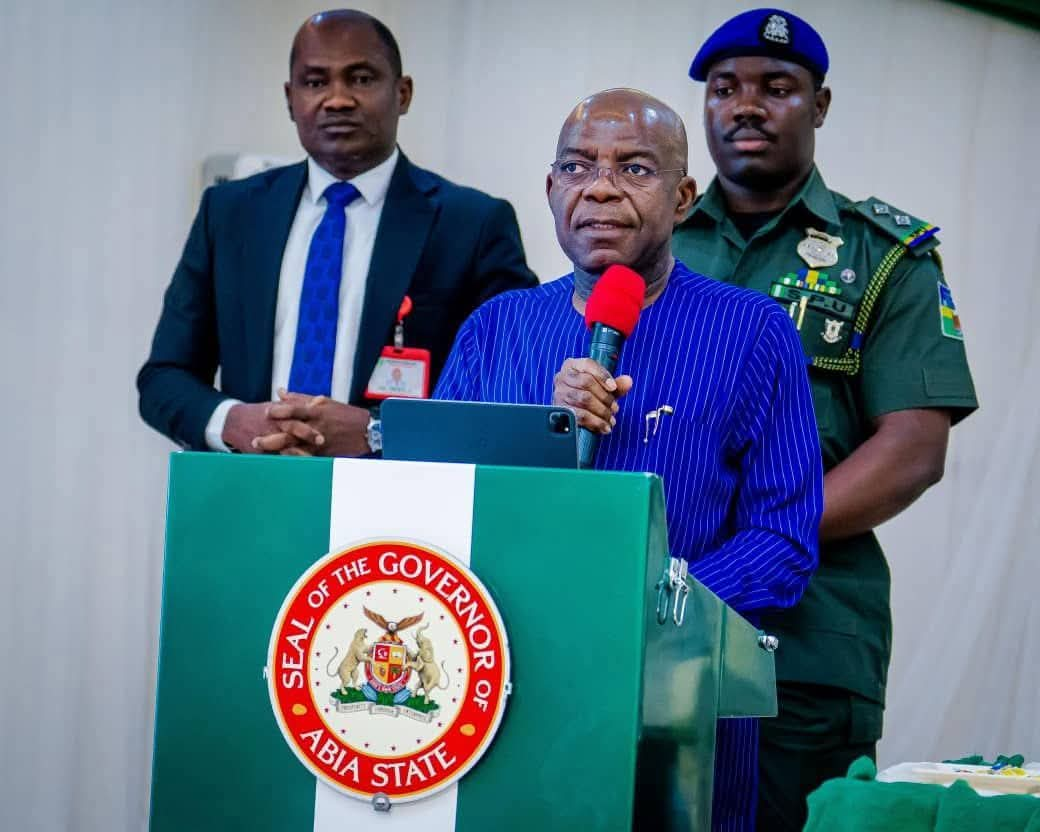Dr. Alex Otti’s Stand On State Creation In Nigeria: A Voice Of Economic Prudence And Equity
EBERE UZOUKWA, PhD

Long before his election as the Executive Governor of Abia State, Dr. Alex Chioma Otti, OFR, had maintained a clear, consistent, and well-articulated position on the contentious issue of state creation in Nigeria. Writing on August 10, 2020, in his widely read policy commentary “Slicing the Fat from Our Pot Bellies III,” Dr. Otti delivered a compelling critique of Nigeria’s over-bloated and economically unsustainable governance structure.
*A Clear Economic Position Against the Proliferation of States*
Dr. Otti strongly opposed the indiscriminate creation of new states, describing Nigeria’s 36-state structure and 774 local governments as fiscally burdensome and largely unsustainable. He referenced BudgIT’s State of the States 2019 report, which revealed that only Lagos, Rivers, and Kano States could meet their recurrent expenditures through internally generated revenue. The remaining states, he argued, were heavily dependent on federal allocations and unsustainable borrowing.
He warned that the continued expansion of the state structure would only exacerbate Nigeria’s fiscal challenges, further inflating the cost of governance without delivering meaningful development outcomes.
> “From a purely economic point of view, most of the states in the country are not viable,” Dr. Otti wrote, questioning whether Nigeria could continue to afford its current administrative framework.
*Exception for the South East: A Case for Justice and Balance*
While rejecting wholesale state creation, Dr. Otti made a principled exception for the South East geopolitical zone, which remains the only region in Nigeria with five states, unlike others with six or seven. He argued that this imbalance undermines the principles of equity, representation, and fairness in the distribution of national resources and political appointments.
> “We believe that one additional state should be created in the South East to bring it at par with other regions, not for politics but for fairness,” he recommended.
According to Dr. Otti, correcting this historic structural inequity would not only advance national unity but also ensure just participation of all zones in Nigeria’s federal system.
*A Rationale Grounded in Sound Governance and Fiscal Responsibility*
As a renowned economist and public policy expert, Dr. Otti’s argument was not rooted in emotion or political expediency, but in rational economic logic and responsible governance. He emphasized the need to optimize existing administrative structures rather than multiplying them. In his view, effective leadership should focus on reducing the cost of governance, investing in critical infrastructure, and creating an enabling environment for private sector growth.
He also cautioned against using state creation as a political tool, noting that many states already struggle to pay salaries, fund capital projects, or meet basic service obligations.
> “Even if the answers to these posers are positive, can we really afford them?” he queried, advocating instead for a leadership culture built on prudence and accountability.
*Position Unchanged as Governor of Abia State*
Today, as the Governor of Abia State, Dr. Alex Otti’s position remains unwavering. His administration continues to reflect the same principles of fiscal discipline, lean governance, and people-centered development. He has demonstrated that governance can be impactful without being bloated, and that efficiency, not expansion, should be the watchword of public administration.
His enduring conviction—that Nigeria must resist the temptation of politically motivated state creation, except for a justifiable case such as the South East—remains as relevant and urgent today as it was in 2020.
*In Summary*
Dr. Otti opposes the proliferation of states due to Nigeria’s weak fiscal capacity and high governance cost.
He supports the creation of one additional state in the South East—strictly on the grounds of equity, justice, and fairness.
His views are anchored on sound economic reasoning and responsible governance.
As Governor, he has remained consistent in principle and action, reflecting deep personal conviction and leadership integrity.
Dr. Ebere Uzoukwa is the Senior Special Assistant to the Governor of Abia State on Public Affairs.
Below is the full text of Dr. Otti’s opinion as published on August 10, 2020.
👇👇👇
Slicing the Fat from Our Pot Bellies III
BY ALEX OTTI
August 10, 2020
“Never use what you require for nourishment to just grow tall” – Local Nigerian Saying
In this concluding part of our discussion of taming the cost of governance, we will look at the states as that arm of government which constitutes the bulk of the waste of scarce resources we experience in the public sector. Every month, the Federal Allocation Committee meets in Abuja to share money to the component parts of government. According to the approved formula for sharing, 56% of funds goes to the Federal Government, while the remaining 44% is shared by the states. Of this amount, 20% should theoretically go to the local governments through the Joint Local Government Account (JAAC), a body that in all practical terms, is also controlled by the states. This is because the local governments are accountable to the state governments. In most cases, in order to control the funds in the JAAC account, states refuse to conduct local government elections, preferring the subterfuge of appointing ‘Transitional’ Council Chairmen and officers, who are completely accountable to the governors. For some state Governors, they simply continue to renew the appointment of the transitional councils ad infinitum to ensure that democratically elected officers do not emerge. Even when the pressure becomes too much, they would simply organise a selection exercise that would guarantee that only their loyalists emerge at the end of such processes. It was all these that led the National Assembly to pass a law recently, aimed at guaranteeing the autonomy of local governments. That one is a story for another day.
Nigeria’s political structure boasts of 36 states as at now, along with 774 local governments. The jury is still out as to whether these are very large numbers or not, when considered alongside the economic situation of our country. Could we have done with fewer states and local governments? We shall attempt to provide answers to these posers during this discourse. The thirty-six-state structure in the country implies that we have 36 governors and 36 Deputy Governors. For each of these states, there is a state House of Assembly charged with promulgating laws for the state. All the Houses of Assembly for the 36 states of the federation put together, have a total of 1,022 members. Now, one must bear in mind that each of the Members of the State House is entitled to a number of aides and personal staff who get paid ‘somehow’ by the states. The remaining members of the executive in the states equally have their own retinue of advisers, special assistants and senior special assistants. These also come along with a retinue of other personal aides. Each of the 36 states has commissioners (which we have estimated at twenty in number per state). These invariably also function along with their own army of staff and aides. The local governments on their own, have Chairmen, Deputy Chairmen and Councilors, who also have their own aides and personal staff.
In its report titled “State of the States 2019 Edition”, Budgit, a public and civic organisation, revealed that out of the 36 states in Nigeria, only three, viz, Lagos, Rivers and Kano, are fiscally sustainable. Budgit defines fiscal sustainability as a state being able to raise enough Internally Generated Revenue, IGR, to defray its recurrent expenditure. In applying this definition, Budgit assumes that most states would continue to rely on external forces like federal allocation and other exogenous inflows, to fund their capital expenditure. Had the report on the other hand, made the assumption that states would fund their total expenditure from internally generated revenue, the picture would have been markedly, and disappointingly, different. From a purely economic point of view, most of the states in the country are not viable. Like we have seen lately, with the advent of the pandemic and the massive drop in oil prices, the Nigerian economy, just like many others in the world, went into a tail spin. Even before the pandemic took effect, recent happenings in the technology space, leading to the discovery of alternative energy sources, which are cleaner and renewable, had put our oil-based economy in a precarious situation. The successful attempt to phase out hydrocarbon-fired vehicles for electric cars, which will become the standard in the next few years in Europe, North America and parts of Asia, has further dampened the hope for a revival in oil prices.
Before the pandemic, majority of the states had been unable to successfully deal with their cash flow challenges. Some State Governors have even been unable to pay the basic salaries of civil servants and other government employees till date. Many of them have already sunk their states into unsustainable debt levels. According to the DMO, out of the total national debt overhang of $79.3b, the states and FCT account for $11.4b or about 15% of the total, as at the end of March 2020. Some of the states have had to depend on non-guaranteed sources of funds like Paris Club refunds, budget support funds and bailouts from the federal government, and outright loans and advances from Commercial and Central Banks. It must be pointed out that these sources of funds are neither regular nor sustainable. The result is that many states have not been able to render the much-needed services to the people, a mandate which is the fundamental reason for the creation of such states in the first place. A major area where most of them have failed woefully is education. Many of the states have virtually abandoned their role of providing qualitative and affordable education for the youth. While the local governments have the responsibility of providing education at the primary level, the states are saddled with the responsibility of providing education at the secondary level. These responsibilities have long been abandoned in many states, leading not only to low enrollment but also poor output.
Healthcare delivery in most of the states is in a state of neglect. This outbreak of the pandemic has further exposed the decrepit state of health care in many states except maybe in the states mentioned earlier, others have no standard hospital that can attend to victims of the coronavirus pandemic. Studies done earlier have shown that whatever metric one chooses to adopt, many of our states fall below acceptable standards. Infant mortality remains very high, maternal mortality, access to drugs, access to medical personnel and doctor patient ratio remain in the very poor quadrant.
A look at the state of infrastructure reveals the alarming level of decay in most states of the federation. Roads have completely collapsed, housing is not even being mentioned in some states and drainages, water, electricity and transport systems have practically decayed. All these come as no surprise because most of the states have found themselves in the same problem that the federal government has been, as more than 70% of their annual budget goes to recurrent spending while a meagre amount, considerably less than 30%, is allocated to capital expenditure. There is the added challenge of many of the states rolling out ambitious budgets that they cannot fund and therefore, the budgets end up not being implemented to any appreciable level.
While these are festering, it is imperative that we don’t sit pretty, hoping that these realities would soon reverse themselves on their own. Our constant essays on reducing the cost of governance are part of our own patriotic call on everyone to begin to prepare for the rainy day as the ominous dark clouds gather. The urgent question that needs to be addressed now is whether we should continue to keep our existing unviable governance structure even when we are convinced that it is a drain on the nation’s scare resources. Some commentators have pushed back to say that if we saved money that were hitherto stolen from the coffers of government, then the cost of governance would pale into insignificance. While we may not completely discountenance this line of argument, we must quickly add that stopping the leakages is not mutually exclusive with controlling our cost of governance. We therefore argue that indeed, we can and should do both, as we can put a stop to ‘relooting’ the looted funds and also cut the cost of governance.
In the medium term, we want to recommend that our states and their leadership need to understand the enormity of the problem. Our concern is that leadership at different levels in the states don’t seem to be conscious of the fact that there is a problem. This is a major issue because a problem that is not acknowledged cannot be solved. Even when states cannot pay salaries one sees that leadership seems not to bother and continues with the lifestyle of leadership that prevailed when we were operating a hundred-dollar-per-barrel-oil economy, when in fact we cannot get half of that amount in the current dispensation. There is this attitude that the cost of running government is a first line charge and must be considered despite the parlous state of revenue. We all know that this is untenable, yet we continue to operate like the proverbial fellow who, while his house is on fire, is preoccupied with hunting rats in the same house.
We also advocate drastic reductionist actions to control costs and be able to carry out the required spend on critical infrastructure for the populace to grow and also enhance internally generated revenue. We may not be in a position to recommend the numbers that would be required in different states but we believe that if leadership is sincere, it will work towards optimising the numbers both at the level of commissioners, and that of the aides also. Just like we posited in our previous interventions, we make bold to state that the compensation packages for the leadership at the state and local government levels do not reflect the state of their respective economies. They will need to make sacrifices for the benefit of their states and local governments.
Closely related to the suggestion of cutting costs is the issue of internally generated revenue in the states and local governments. Governments at these levels should understand that going to share money in Abuja, though had been done for a long time is not a sustainable way to run government. While they could continue to enjoy this for as long as it lasts, they should immediately start thinking of when there is no more money to share in Abuja. Like we had demonstrated above, the time for this to happen does not seem farfetched anymore. To generate revenue locally, governments must invest in creating the enabling environment for businesses to thrive and share in the prosperity it has created. Frankly speaking, they must give scope for the private sector to lead economic activities in the states.
Expecting that it is possible to collect taxes without making the state and local government competitive is like expressing water out of rock. Therefore, our governments should do away with the mindset that investing in infrastructure for the populace must be centred on political patronage. Some very viable towns and cities have been allowed to rot by subsequent governments on account of this kind of political reasoning. What those who indulge in this fail to realise is that as they believe they are punishing their enemies in those towns by not investing in infrastructure and renewals, they are at the same time kissing their IGR goodbye. Again, states must see themselves as being in competition. And they truly are in competition. Why would a businessman chose to locate his business in one state rather than the other? You think that just because the governor is friends with a businessman that it is enough to consider you a preferred investment destination? If there is anything that is rational and without emotions, it is capital. Capital shows up in a location that has prepared itself not only to receive it but also to protect it and votes with its feet when it senses danger. So, when you see leaders working round the clock to ensure that there is adequate security for their states or local governments, when you see leaders going on a roadshows to showcase their potential, when you see leadership working on ease of doing business, when you see leadership working very hard on building critical infrastructure for the populace, when you see leaders investing in bringing gas to their industrial zones; then know that such leaders understand that it is not a favour for the populace but a business decision to attract investors and enhance IGR potential.
Finally, we would like to do a recap on all the critical issue we have dealt with in this piece, and they are as follows: Do we need 36 states with FCT? Do we need 36 State Governors, their Deputies, Commissioners and their army of aides numbering tens of thousands? Do we need 36 Speakers, Deputies, Principal Officers for the Houses, and over 1,000 members nationwide with their retinue of aides? Do we need 774 local government Chairmen and their Deputies, Councilors and their aides? Even if the answers to these posers are positive, can we really afford them? Should we not cut down these numbers? Can we do all what is required to achieve the reduction? Do we have dedicated leadership that can understand the point that we are making here and make these changes? Questions, questions, questions! Only time will tell.












